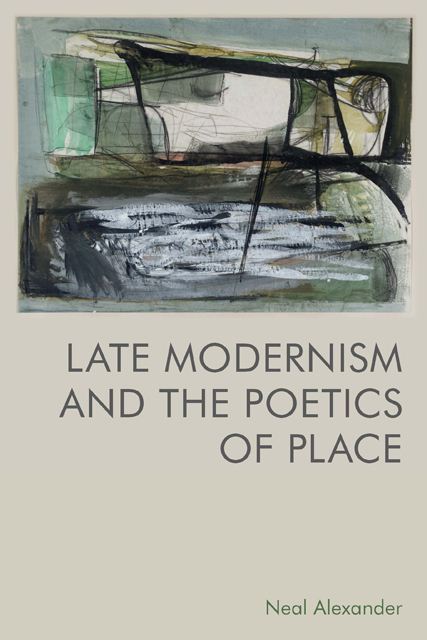Book contents
- Frontmatter
- Contents
- Acknowledgements
- Introduction
- 1 David Jones: The Sites of History
- 2 Basil Bunting’s Regional Modernism
- 3 W. S. Graham: Between Places
- 4 Lorine Niedecker: Life by Water
- 5 Charles Olson’s Mappemunde
- 6 Gwendolyn Brooks: From Bronzeville to the Warpland
- Conclusion: After Late Modernism
- Notes
- Bibliography
- Index
2 - Basil Bunting’s Regional Modernism
Published online by Cambridge University Press: 18 November 2022
- Frontmatter
- Contents
- Acknowledgements
- Introduction
- 1 David Jones: The Sites of History
- 2 Basil Bunting’s Regional Modernism
- 3 W. S. Graham: Between Places
- 4 Lorine Niedecker: Life by Water
- 5 Charles Olson’s Mappemunde
- 6 Gwendolyn Brooks: From Bronzeville to the Warpland
- Conclusion: After Late Modernism
- Notes
- Bibliography
- Index
Summary
Basil Bunting's poetic representations of place are shaped by a geographical imagination that thrives on contradictions. His regional modernism is characterised both by the imaginative centrality of northern landscapes and cultural paradigms to his writing, and by the refraction of such local and regional attachments through a self-consciously international modernist poetics. Bunting's major work, Briggflatts (1966), explores its twin themes of dislocation and homecoming through an intense imaginative engagement with the history, geography, and linguistic textures of the North-east of England. However, Bunting's poem is also a deliberately eccentric poetic autobiography that both enacts the expression of a securely ‘northern’ regional identity and suspends any such existential anchoring through its formal disjunctions and dense collage of incommensurable spaces and times. If the poem can be regarded as celebrating locality and belonging in a cherished regional landscape, it also attests to experiences of displacement and encounters with otherness, foregrounding vagrancy as a characteristically modern mode of being-in-the-world. In part, this world-view derives from Bunting's own personal experiences, for his idiosyncratic career as a poet, journalist, interpreter, diplomat, and MI6 agent entailed temporary residences in France, Italy, the United States, the Canary Islands, and Iran, before his return to his home place, Northumberland, in 1952, more than thirty years after his first departure in 1919. However, Bunting's emphasis upon mobility, journeying, and transience in his later poems is also integral to his reflections on modernity, echoing György Lukács's claim that ‘transcendental homelessness’ is characteristic of the modern condition. My purpose in this chapter is to demonstrate the extent to which regional, national, and international horizons are articulated together in his poetics of place, with particular reference to Briggflatts as a paradigmatic example of regional modernism.
Region and Nation
At first sight, the phrase ‘regional modernism’ appears oxymoronic, its two terms – adjective and noun – pulling in opposite directions. A well-rehearsed and widely accepted narrative about literary modernism defines it as an essentially metropolitan phenomenon with an emphatically internationalist character. Most of the major Anglophone modernist writers – including Ezra Pound, T. S. Eliot, James Joyce, and Gertrude Stein – were exiles or émigrés whose texts are conspicuously polyglot, multi-form, and composed of diverse cultural materials.
- Type
- Chapter
- Information
- Late Modernism and the Poetics of Place , pp. 52 - 80Publisher: Edinburgh University PressPrint publication year: 2022



